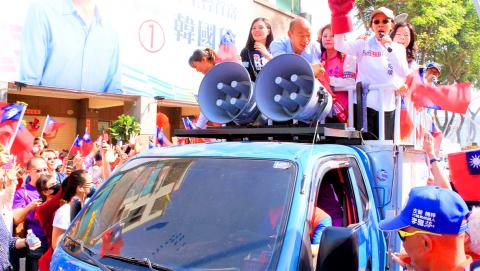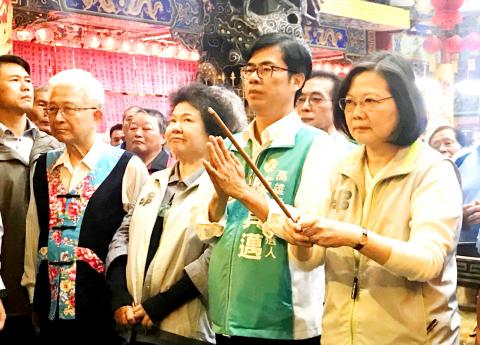China has been employing “a Russia-style influence campaign” to meddle in Taiwan’s elections, the New York Times said on Thursday.
The report, titled “Specter of Meddling by Beijing Looms Over Taiwan’s Elections” and authored by Chris Horton, said that as voters prepare to head to the polling booths today for the nine-in-one local elections, “concerns are growing that Beijing’s long effort to sway [Taiwan’s] politics has been armed with a new weapon: a Russia-style influence campaign.”
“Taiwan officials are sounding alarms at what they say is a campaign by Beijing to spread disinformation that serves its agenda by exploiting [Taiwan’s] freewheeling public discourse,” the newspaper said, adding that officials “say the population of 23 million is regularly fed misleading information in the news media and on social networks that range from unverified footage of large-scale Chinese military drills to false reports of stranded travelers being abandoned” by the government.

Photo: CNA
The volley of misinformation appeared aimed at undermining President Tsai Ing-wen’s (蔡英文) administration and the Democratic Progressive Party (DPP), it said.
“Authorities say they suspect that Beijing is also illegally funneling money to political campaigns through Taiwan businesses in mainland China. Late last month, the government said that it was building cases against candidates who were being funded by Beijing and that it had shut down two underground money exchanges through which funds earmarked for influencing the election had been flowing,” the newspaper said.
“Taiwan’s government fears the use of social media misinformation campaigns are a new front for meddling,” it added.

Photo: CNA
China’s Taiwan Affairs Office spokesman Ma Xiaoguang (馬曉光) was quoted denying interference in the elections, saying that Tsai’s Facebook posts about the issue were “fake news” and “not even worth refuting.”
However, “the propaganda war goes back seven decades, with attacks originating from both sides of the Taiwan Strait,” the newspaper said.
“Taiwan leaders say the propaganda is now carried over the Strait through posts on Facebook, the chat app Line and a popular online bulletin board,” it said.
“Concerns about Chinese meddling have grown as the election race heats up. Of particular concern to Ms Tsai and her party is the mayoral race in the southern city of Kaohsiung, where [Chinese Nationalist Party (KMT) candidate] Han Kuo-yu (韓國瑜) ... has enjoyed a surprising surge in popularity,” the newspaper said.
According to the newspaper, lawyers for DPP Kaohsiung mayoral candidate Chen Chi-mai (陳其邁) last month said “they had evidence that misinformation defaming Mr Chen that had spread widely on Taiwanese social media had originated from overseas accounts, including some with mainland IP [Internet Protocol] addresses.”
The New York Times quoted Academia Sinica assistant research fellow Nathan Batto as saying that “it’s difficult to determine exactly how much influence Beijing is having on the Kaohsiung race ... because discussions often take place in closed, private groups.”
“It’s hard for us to look in from the outside and see exactly how much there is and exactly how much influence it’s having,” Batto was quoted as saying. “We have some sort of fuzzy idea that they’re helping Han Kuo-yu in Kaohsiung quite a bit — but I don’t know if that’s why he’s surged in the polls or not.”

AGING: As of last month, people aged 65 or older accounted for 20.06 percent of the total population and the number of couples who got married fell by 18,685 from 2024 Taiwan has surpassed South Korea as the country least willing to have children, with an annual crude birthrate of 4.62 per 1,000 people, Ministry of the Interior data showed yesterday. The nation was previously ranked the second-lowest country in terms of total fertility rate, or the average number of children a woman has in her lifetime. However, South Korea’s fertility rate began to recover from 2023, with total fertility rate rising from 0.72 and estimated to reach 0.82 to 0.85 by last year, and the crude birthrate projected at 6.7 per 1,000 people. Japan’s crude birthrate was projected to fall below six,

US President Donald Trump in an interview with the New York Times published on Thursday said that “it’s up to” Chinese President Xi Jinping (習近平) what China does on Taiwan, but that he would be “very unhappy” with a change in the “status quo.” “He [Xi] considers it to be a part of China, and that’s up to him what he’s going to be doing, but I’ve expressed to him that I would be very unhappy if he did that, and I don’t think he’ll do that. I hope he doesn’t do that,” Trump said. Trump made the comments in the context

SELF-DEFENSE: Tokyo has accelerated its spending goal and its defense minister said the nation needs to discuss whether it should develop nuclear-powered submarines China is ramping up objections to what it sees as Japan’s desire to acquire nuclear weapons, despite Tokyo’s longstanding renunciation of such arms, deepening another fissure in the two neighbors’ increasingly tense ties. In what appears to be a concerted effort, China’s foreign and defense ministries issued statements on Thursday condemning alleged remilitarism efforts by Tokyo. The remarks came as two of the country’s top think tanks jointly issued a 29-page report framing actions by “right-wing forces” in Japan as posing a “serious threat” to world peace. While that report did not define “right-wing forces,” the Chinese Ministry of Foreign Affairs was

PREPAREDNESS: Given the difficulty of importing ammunition during wartime, the Ministry of National Defense said it would prioritize ‘coproduction’ partnerships A newly formed unit of the Marine Corps tasked with land-based security operations has recently replaced its aging, domestically produced rifles with more advanced, US-made M4A1 rifles, a source said yesterday. The unnamed source familiar with the matter said the First Security Battalion of the Marine Corps’ Air Defense and Base Guard Group has replaced its older T65K2 rifles, which have been in service since the late 1980s, with the newly received M4A1s. The source did not say exactly when the upgrade took place or how many M4A1s were issued to the battalion. The confirmation came after Chinese-language media reported